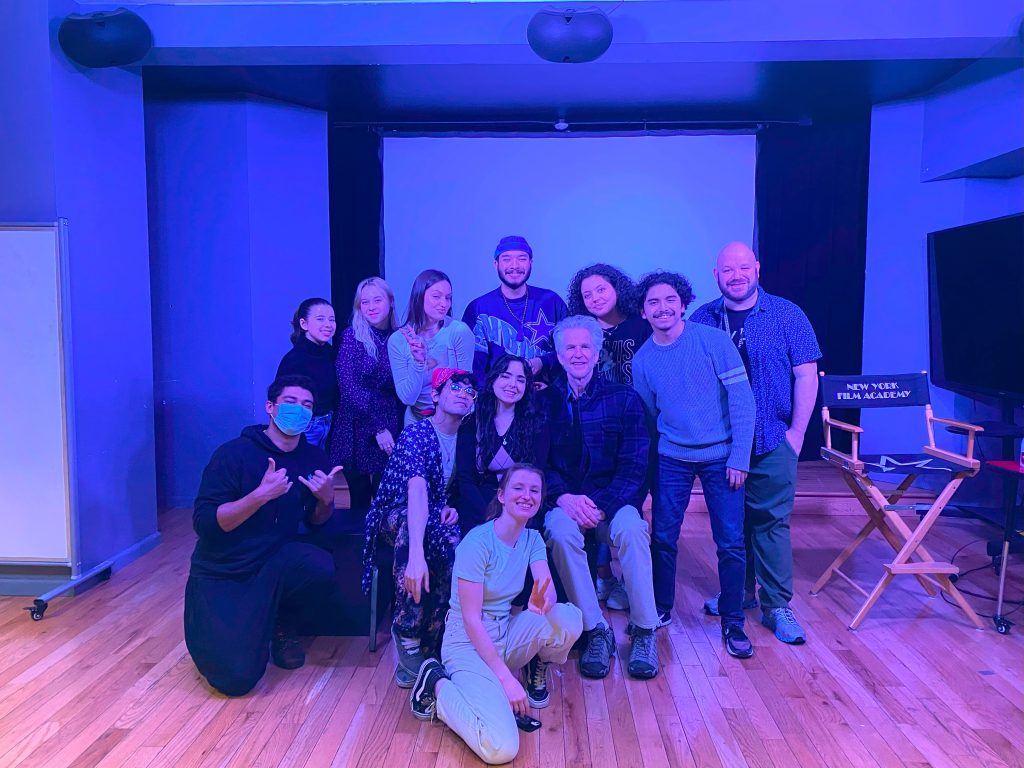At one point, every aspiring actor will question whether or not they should attend acting school. For students who also want to earn a degree, there may be the decision if they should enroll in acting college. The decision to pursue acting in an academic setting is often driven by a desire to develop and refine one’s craft in a structured and supportive environment, as acting school offers students access to professional training and opportunities to practice and showcase their skills.
Furthermore, attending acting school can provide aspiring actors with valuable networking opportunities and industry insights that can help them pursue their interests in film and television, as well as musical theatre, content creation, and more.
What Do You Learn in Acting College?
While the curricula of different acting schools will vary, there are basic fundamentals and best practices that many acting colleges teach aspiring performers. In the acting degree programs at NYFA, students get comprehensive training in various acting techniques under the guidance of seasoned acting professionals. The intensive coursework and small classes allow students to fully immerse themselves in their acting classes, helping to prepare them for the challenges of the film, media, and entertainment industries.
Lynda Goodfriend, the Creative Director of NYFA’s acting department, recently appeared on the podcast “Paltrocast With Darren Paltrowitz,” discussing her time teaching at New York Film Academy, as well as her history working on the sitcom Happy Days. Lynda, who played Lori Beth Cunningham opposite director and NYFA Guest Speaker Ron Howard and NYFA Guest Speaker Henry Winkler, spoke about NYFA’s growth and what acting students can expect to learn during their time here.
Lynda, who has also worked as a manager and acting coach while running her own acting school, describes her time teaching at NYFA as “exciting.”
“I helped develop the master’s and bachelor’s program,” says Goodfriend. “I see these young actors be creatives. They don’t have to wait like I did.”
Goodfrend is referring to the ample opportunities that NYFA students have to practice their craft and develop their reel, as they complete hands-on projects, exercises, and scene work. In this post, we’ll discuss what NYFA acting degree students learn during their time studying at our school.
How to “Tune” Your Instrument
Emmy-nominated actor Matthew Modine, who also appeared in this year’s Oscar-winning Oppenheimer, visited NYFA New York to work with BFA acting degree students on their final monologues. During the class, Modine compared the ability of acting to playing an instrument and brought students through various exercises to help students adjust and experiment with the “rhythm” of their dialogues. Modine, who is also an NYFA board member, producer, and director, encouraged students to try to dig into the details of their dialogues and characters, set constraints, have a conversation with the audience, and perform an action while reading their lines to help loosen up the scenes.

Modine, who has a filmography dating back to the 1980s with hits like Birdy, Vision Quest, and Full Metal Jacket, can easily tap into his experience and diagnose and communicate the challenges of a scene, providing priceless insight to aspiring actors.
The Importance of Tapping Into Human Behavior
Actors need to understand human behavior to portray characters convincingly and authentically. By comprehending the complexities of human emotions, motivations, and relationships, actors can bring depth and realism to their performances, creating characters that resonate with audiences on a profound level. This understanding allows actors to empathize with their characters, embody their experiences, and effectively communicate their stories, enhancing the emotional impact of their work.
Josephine Wilson, the acting chair at NYFA New York, says she encourages her acting students “to learn to be very curious about the other actors on stage with them by listening to their whole being.”
“This is where the exciting human behavior begins,” she said in an interview with NYFA.
The Value of Mastery
“There are no small parts, only small actors,” said Konstantin Stanislavski. Remembering these words is important for up-and-coming actors who are still in acting college. It means that actors should give their full attention and effort to every part they have, even if they’re not the star of the show.

The late Carl Weathers, who was featured on a panel at NYFA, underlined the importance of this mastery when he said, “I don’t think anybody goes in saying I want to do a mediocre work. Everybody wants what they want. You want to do the next Black Panther, you want to do the next Avengers. Something that just blows up in the world, right?”
This perspective keeps student actors focused on building experience and refining their skills, preparing them for the opportunities that they’re working toward.
How to Interpret a Scene
Actors must interpret scenes to effectively convey the intentions and emotions of their characters within the context of the story. By understanding the underlying subtext, themes, and character motivations, actors can bring depth and nuance to their performances, creating compelling and believable portrayals. NYFA alum Aubrey Plaza, who returned to NYFA for a Q&A, described her experience unpacking her character in the thriller Black Bear, a role that required her to dive into the complexities of the story and script.
“The movie within the movie just because that scene was very complex (a lot of people and a lot of chaos). That was the day, I was always scared and terrified to shoot it and it was a lot to keep all of those things in play and, in a technical sense, it was very trippy,” she said.
Why Ambition Can Trump Talent
For actors, determination is often key to finding success in the highly competitive entertainment industry. To become a working actor, students must develop resilience, perseverance, and the ability to withstand rejection and criticism. NYFA Guest Speaker Al Pacino, known for legendary films such as Francis Ford Coppola’s The Godfather, shared this sentiment in a Q&A at NYFA’s Los Angeles campus, as he reflected on what he’s learned during his long illustrious career.

“It taught me to love people more. I feel more a part of the world. And that we’re all actors. Only some of us can really do it. Some of us have the ability to do it…and the desire to do it,” he said. “And it taught me that desire can sometimes trump talent. Think about that. So that you may not have as much talent as you think you have, but if you have the desire, your talent will find you.”
Essentially, while talent is undoubtedly valuable, it is determination that drives actors to continually improve their craft, seek out opportunities, and overcome obstacles on the path to achieving their goals. With unwavering determination, actors can navigate the challenges of the profession and persist in the face of setbacks.
The Importance of Source Material
Many young actors may find that even as performers, they will still need to research the source material of their roles. Source material provides actors with essential context and insight into the characters, settings, and themes of the production. By studying the source material, whether it’s a play, script, novel, or historical event, actors gain a deeper understanding of the world their characters inhabit, allowing them to make informed creative choices and develop more nuanced performances.

For actors such as NYFA Guest Speaker Elizabeth Olsen, who appeared as Candy Montgomery in Max’s limited series Love and Death, as well as the Scarlet Witch in the Marvel Universe, this means asking questions about the character’s physicality and appearance. Echoing Modine’s beliefs on diving into the details of a script, Olsen believes in the value of research.
How to Set Aspirations and Goals
There’s a famous Hollywood urban legend about actor Will Smith strategizing with his agent about only going after Blockbuster roles. While this may or may not be 100% accurate, there is truth to the importance of actors having a strategy and goals for the kind of films and television shows they want to do. While it may not always be possible for new actors to get the exact type of roles they want in the beginning, many actors admit to dreaming about landing the kinds of roles they would eventually win.

Marvel actor Simu Liu, for instance, admitted in a Q&A with NYFA that playing a superhero had literally been on his “vision board”. He described that as an aspiring actor, he would “look off into the horizon” and make up a role that he would want more than anything. It seems to have paid off for Liu, who has multiple films in production and appeared as Ken in the 2023 summer blockbuster Barbie.
NYFA also offers aspiring performers with on-campus resources to help them set and achieve their goals. The Career and Alumni Services department provides career direction tools such as assistance with creating a resume, highlight reel, and portfolio, as well as assistance finding internships and preparing for auditions, with insights on what casting directors look for. NYFA’s Film Festival department is also a resource for performers and filmmakers looking to get their work into festivals, and can current NYFA students come up with an effective festival strategy.
The Possibility of Bringing Your Own Roles to Life
The evolution of social media has brought endless opportunities for actors to create their own roles. By having a way to broadcast an original web series or podcast, actors are empowered to create characters that resonate with audiences in meaningful and innovative ways, resulting in performances that are dynamic, memorable, and uniquely their own. Content creator and comedian Sabrina Brier, for example, created a channel on TikTok to launch a series of original skits, leading to an appearance on the hit TV show Abbott’s Elementary in season three.
Creating the kind of role you want to play was the driving force behind the television series Crazy Ex-Girlfriend starring NYFA Guest Speaker Rachel Bloom. Bloom, inspired by her love for musical theatre and the performing arts, co-created and starred in the TV series. She also co-wrote many of the original songs for the series. Bloom’s path to stardom shows the value of building additional skills outside of acting.
At New York Film Academy, students can collaborate and connect with peers of aspiring filmmakers, directors, screenwriters, and producers. For students who want to gain more experience and add scenes to their reel, the opportunity to create your own film and write the role that you want to perform can be life-changing. NYFA’s new BFA in Entertainment Media was also specifically designed for students who want to immerse themselves in various fields of study, allowing them to learn the fundamentals of an acting program and cross-pollinating across other storytelling disciplines.
Find Your Next Role at NYFA
Ready to unlock your inner performer? Our acting school offers the building blocks required to build a strong foundation of skills in acting for film. To learn more, explore the acting programs and degrees at New York Film Academy. Our immersive acting programs are available at our campuses in New York City, Los Angeles, and Miami.